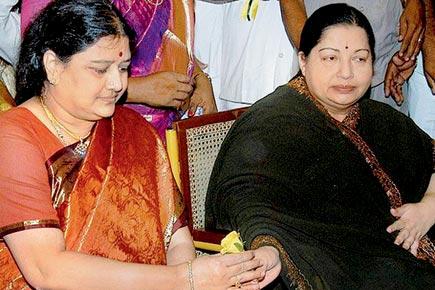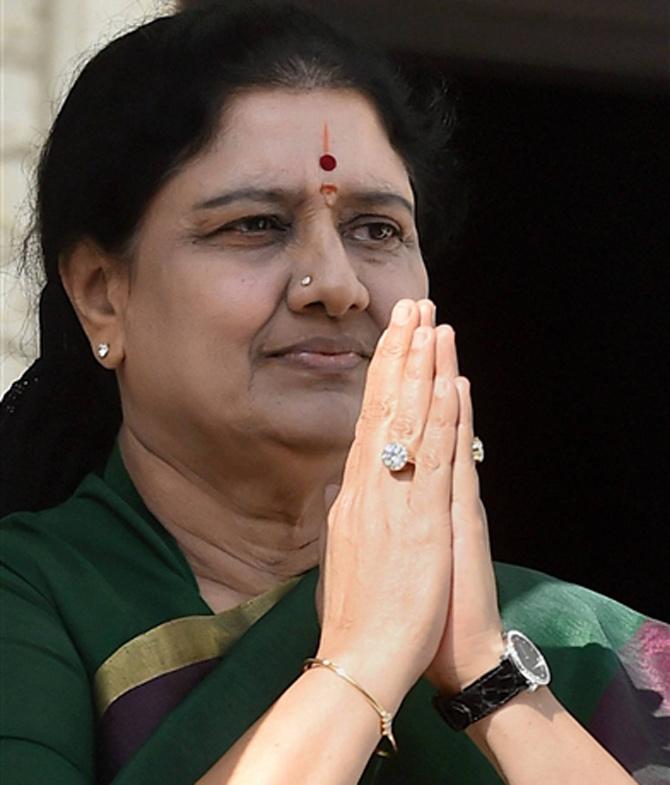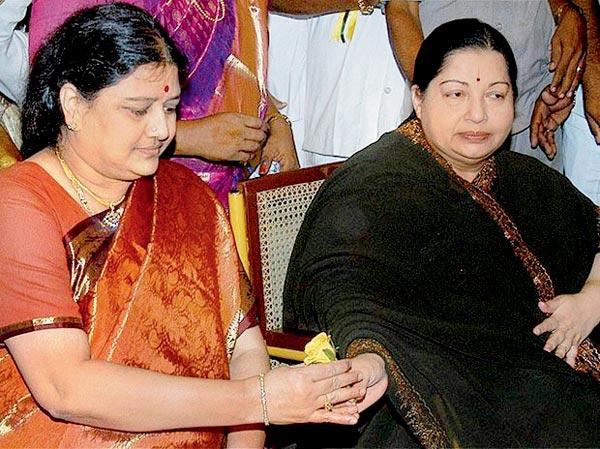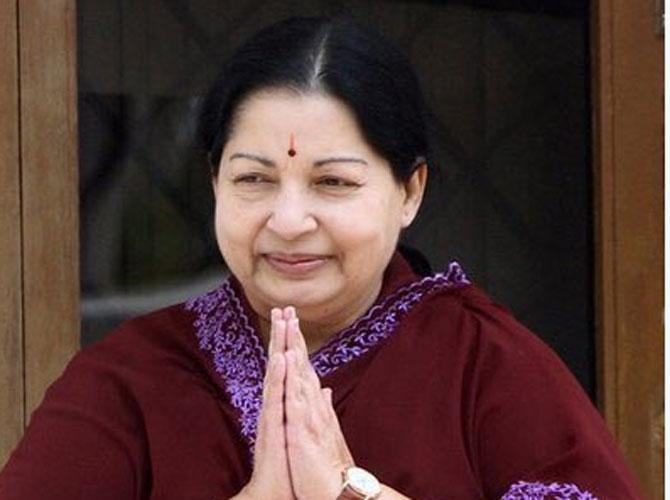The Supreme Court on Tuesday convicted AIADMK General Secretary Sasikala Natarajan, who is aspiring to be the Tamil Nadu Chief Minister, in a disproportionate assets case

 Sasikala
Sasikala
ADVERTISEMENT
The Supreme Court on Tuesday convicted AIADMK General Secretary Sasikala Natarajan, who is aspiring to be the Tamil Nadu Chief Minister, in a disproportionate assets case.
J Jayalalithaa, Sasikala and her two relatives, Ilavarasi and Sudhagaran, had been convicted in the case that alleged that the former Chief Minister owned assets far exceeding her known sources of income. After they were acquitted in 2015, an appeal was filed in the Supreme Court.
Also Read: Supreme Court convicts Sasikala in disproportionate assets case
1996: Subramanian Swamy, then Janata Party chief, files a case against Jayalalithaa alleging that during her tenure as Tamil Nadu Chief Minister from 1991 to 1996, she amassed properties worth Rs 66.65 crore disproportionate to her known sources of income.
Dec 7, 1996: Jayalalithaa arrested. Many allegations follow, including accumulation of disproportionate assets.
1997: Prosecution launched in sessions court in Chennai against Jayalalithaa and three others for having assets 'disproportionate' to their known income.
June 4, 1997: They are charge-sheeted for offences under sections 120-B IPC, 13(2) read with 13(1)(e) of the Prevention of Corruption Act, 1988.
October 1: Madras High Court dismisses 3 petitions by Jayalalithaa including one challenging the sanction granted by then Governor M Fathima Beevi for prosecuting her. Trial progresses. By August 2000, 250 prosecution witnesses examined and only 10 more remained.

In the May 2001 Assembly elections, AIADMK secures absolute majority and Jayalalithaa becomes CM. Her appointment is challenged due to her conviction in October, 2000 in the TANSI (Tamil Nadu Small Industries Corporation) case. The Supreme Court nullifies the appointment.
September 21, 2001: Jayalalithaa ceases to be CM. After her conviction is set aside, Jayalalithaa is elected to the Assembly in a bypoll from Andipatti constituency on February 21, 2002, and again sworn in as CM.
2003: DMK general secretary K Anbazhagan approaches SC for transferring the trial to Karnataka on the ground that a fair trial was not possible in Tamil Nadu with Jayalalithaa as CM.
November 18, 2003: SC transfers the case to Bengaluru.
February 19, 2005: The Karnataka government appoints B V Acharya, a former Advocate General, as Special Public Prosecutor to conduct the prosecution.
October/November 2011: Jayalalithaa deposes in the Special Court and answers 1,339 questions.
August 12, 2012: Acharya expresses his inability to continue as SPP. Karnataka government accepts his resignation in January, 2013 and discharges him from the case.
February 2, 2013: Karnataka government appoints G Bhavani Singh as SPP.
August 26, 2013: Karnataka government issues a notification withdrawing the appointment of Bhavani Singh as SPP without assigning any reason and without consulting the Chief Justice of the Karnataka High Court.
September 30, 2013: SC quashes the notification withdrawing appointment of Bhavani Singh as SPP. December 12, 2013: Special Court allows plea by DMK General Secretary K Anbazhagan and directs physical production of valuables and other assets seized from Jayalalithaa in 1997 and deposited in an RBI treasury in Chennai.
February 28, 2014: Special Court dismisses plea by SPP seeking a direction to produce before it the seized silver articles belonging to her. Judge says SPP had filed it only with the purpose of delaying the proceedings.
March 14/15, 2014: Special Court imposes a cost of one-day salary on SPP Bhavani Singh for not resuming final arguments citing ill-health.
March 18, 2014: Singh moves Karnataka HC challenging the special court order imposing cost.
March 21, 2014: HC rejects his petition saying the order of the special court imposing cost was right.
August 28, 2014: Special Court reserves judgement for September 20 and directs all the four accused, including Jayalalithaa, to appear before it on that date.
September 16, 2014: Special Court defers by a week to September 27 the pronouncement of its verdict.
September 27, 2014: Special Court convicts Jayalalithaa and three others including aide Sasikala. Awards four years' prison term to Jayalalithaa, slaps Rs 100 crore fine.
September 29, 2014: Jayalalithaa moves Karnataka HC challenging conviction, seeks bail.
October 7, 2014: High Court denies bail, citing 'no grounds,' to do so.
October 9, 2014: Jayalalithaa moves SC seeking bail.
October 17, 2014: SC grants bail to Jayalalithaa.
 Jayalalithaa
Jayalalithaa
October 18, 2014: After 21 days in prison, Jayalalithaa released from prison on bail. SC says it will ask Karnataka High Court to complete hearing on appeal in three months.
December 18, 2014: SC extends Jayalalithaa's bail by four months. A bench headed by CJI H L Dattu orders that her appeal challenging conviction in Karnataka HC be conducted on a day-to-day basis by a Special Bench.
February 26, 2015: DMK General Secretary K Anbazhagan moves SC seeking stay of the case against Jayalalithaa questioning impartiality of SPP Bhawani Singh.
March 9, 2015: SC issues notice to Jayalalithaa and others on plea by Anbazhagan seeking removal of prosecutor.
March 11, 2015: Karnataka HC reserves order on appeal by Jayalalithaa and three others including confidante Sasikala in disproportionate assets (DA) case.
April 1, 2015: Jaya defends Singh's continuance.
April 15, 2015: SC gives split verdict on plea seeking removal of Bhawani Singh in Jayalalithaa's DA case before Karnataka HC, refers the matter to a larger bench.
April 27, 2015: SC rejects Bhawani Singh's appointment as "bad in law", says case does not warrant de novo (fresh) hearing of appeals. Allows Anbazhagan and Karnataka to file written submissions in HC.
April 27, 2015: Anbazhagan files written submission with Karnataka HC seeking confirming of Jayalalithaa's sentence.
April 28, 2015: B V Acharya appointed new SPP, files written submission before Karnataka HC praying for dismissal of Jayalalithaa's appeal.
May 8, 2015: Karnataka High Court notification says Special Vacation Bench of Justice CR Kumaraswamy will pronounce verdict on Jayalalithaa's appeal on May 11, 2015.
May 11, 2015: Karnataka HC acquits Jayalalithaa and three others.
June 23, 2015: Karnataka Govt moves SC against Jayalalithaa's acquittal in DA case.
July 27, 2015: SC issues notice to Jayalalithaa on appeal challenging her acquittal.
February 23, 2016: SC commences final hearing on the appeals against Jayalalithaa's acquittal.
June 7, 2016: SC reserves verdict on appeals in DA case against Jayalalithaa.
December 5, 2016: Jayalalithaa dies after prolonged illness in Chennai.
February 14, 2017: SC convicts Sasikala and her two relatives, V N Sudhakaran and Elavarasi by restoring the trial court verdict in toto directing them to serve the remaining jail term.
The case dates long back in 1996 which involved Jayalalithaa. The pronouncement of verdict in the apex court which decided the
fate of AIADMK General Secretary V K Sasikala in the disproportionate assests case, was completed in about eight minutes.
The two judges, Justices P C Ghose and Amitava Roy, reached the dias at 10.32 am in Court Number 6, which was jam- packed with a large number of advocates and mediapersons. After the seal of the voluminous judgement was opened by the court staff, the two judges held discussion for a few moments.
-with agency inputs
 Subscribe today by clicking the link and stay updated with the latest news!" Click here!
Subscribe today by clicking the link and stay updated with the latest news!" Click here!






